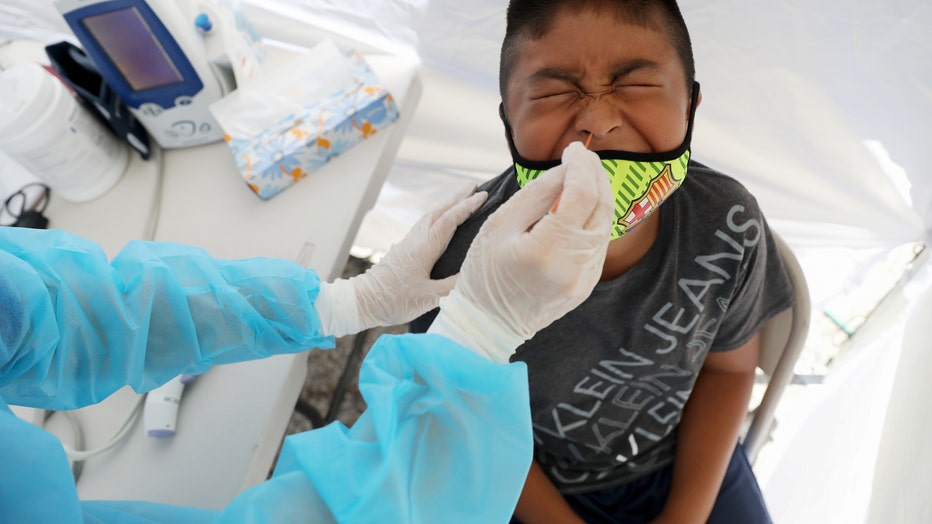CDC: Nearly 600 children hospitalized in US with inflammatory condition linked to COVID-19
COVID-19 and MIS-C: What parents need to know
Most affected children have had current or recent coronavirus infections, the CDC said.
LOS ANGELES - A report from the U.S. Centers for Disease Control and Prevention found that nearly 600 children have been hospitalized in the United States with a rare inflammatory syndrome associated with the novel coronavirus during the pandemic.
The CDC had issued warnings to health care providers and parents in May about multisystem inflammatory syndrome in children, or MIS-C.
The CDC report covered illnesses that began from mid-February to mid-July. Forty states reported cases.
The agency found that as of July 29, a total of 570 child patients were diagnosed with MIS-C, according to state health departments across the country. The CDC also found that all MIS-C patients had tested positive for the coronavirus, and 10 died.
According to the CDC, MIS-C is a condition that causes various parts of the human body to become inflamed, including the heart, lungs, kidneys, brain, skin, eyes, or gastrointestinal organs.
RELATED: COVID-19 and multisystem inflammatory syndrome in children: What parents need to know
While symptoms of MIS-C can vary from case to case, they can include a persistent fever, rash, conjunctivitis, stomach ache, vomiting, diarrhea, swollen lymph nodes in the neck, swollen hands and feet, cracked lips and a tongue that is redder than usual, according to Harvard Health, a blog by Harvard Medical School.
“We do not yet know what causes MIS-C. However, many children with MIS-C had the virus that causes COVID-19, or had been around someone with COVID-19," the CDC said.
The CDC said that the inflammatory condition was first reported in the United Kingdom as early as late April, and on May 12, New York City Mayor Bill de Blasio said 100 children in the city had been diagnosed for MIS-C. Of the 100, 55 tested postive for COVID-19 or had antibodies.
“The underlying problem that results in MIS-C seems to be a dysfunction of the immune system,” said Dr. Ermias Belay, who is leading the CDC team looking into MIS-C cases.
Some children with the syndrome have symptoms resembling Kawasaki disease, another rare childhood condition that can cause swelling and heart problems.
The immune system kicks into overdrive when it sees the virus, releasing chemicals that can damage different organs, Belay said.
The CDC report found that 13% of kids with the condition were White, while more than 40% were Hispanic and 33% were Black. Overall, about half of U.S. children are White, around 25% Hispanic and about 14% are Black, according to population estimates.
Scientists are still learning about the condition. Experts say genetics has nothing to do with why some racial and ethnic groups are more likely to get seriously sick from the novel coronavirus or die from it. But it's not yet clear if genetics play a role in the childhood inflammatory condition, according to Dr. Cyrus Shahpar, who oversees epidemic prevention efforts for a not-for-profit data and advocacy organization called Vital Strategies, and Belay.

FILE - A boy receives a free COVID-19 test at a St. John’s Well Child & Family Center mobile clinic set up outside Walker Temple AME Church in South Los Angeles amid the coronavirus pandemic on July 15, 2020 in Los Angeles, California. (Photo by Mario Tama/Getty Images)
Health experts say that while the condition remains relatively rare, it is serious. Parents should be vigilant and report any symptoms to a doctor — particularly if children have a prolonged fever lasting more than a couple days.
“Parents really shouldn’t be afraid to take their child to their pediatrician if they’re worried they’re sick,” said Dr. Sean O’Leary, pediatric infectious disease specialist at Children’s Hospital Colorado.
“They should also, of course, make sure they are keeping up on their well-child care and their vaccinations. The diseases we prevent with vaccines are actually much more severe in children than COVID-19, so we want to make sure to protect children from those diseases.”
The Associated Press contributed to this story.

